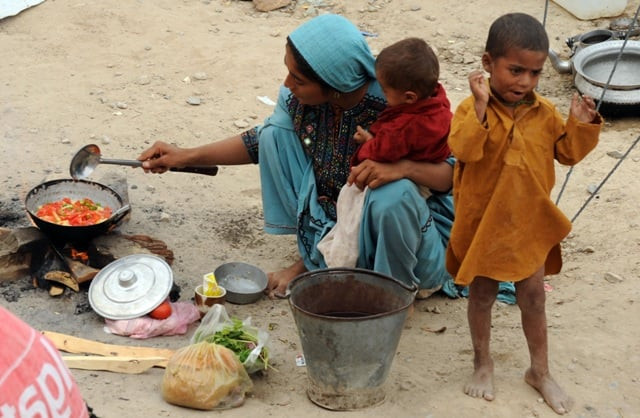People’s tribunal: Flood-hit people hit out at govt’s sluggish relief work
Complaints include relief aid mismanagement, limited infrastructure repair.

Flood-affected communities have expressed their dissatisfaction over relief and recovery efforts in the provinces devastated by the 2010 and 2011 floods and warned that millions of poor people may be affected as a result of the flawed preparedness and early warning systems.
They expressed these views during a Peoples Tribunal on Challenges in Flood Relief and Recovery in Pakistan, organised by Participatory Development Initiatives (PDI) in collaboration with Oxfam, according to a press release issued by the hosts on Monday.
The flood affected communities from Sindh while said that local communities have been under water for the last seven months as the flood water has yet not removed from their areas/ villages via dewatering. A number of union councils in Umerkot, Sanghar, Mirpurkhas, Benazirabad, Badin and other districts are still under water. Villages are disconnected from each other and local communities are unable to cultivate crops or provide fodder to their remaining livestock due to the standing water, which also affects soil fertility. They claimed that about 40 per cent of the flood-affected communities may not be able to cultivate their crops in Sindh.
Schools and colleges in flood-hit areas were completely destroyed. The ones spared by the floods became camps. Now, even those schools are in ruins and the furniture and other facilities are missing. Millions of children have been deprived of education for the last seven months, and there is no planned project to rehabilitate these schools, local community representatives alleged.
The local communities from Balochistan alleged that 2010 floods were manmade disaster for Jaffarabad and other districts of Balochistan as flood water was “deliberately given passage to inundate Balochistan”.
The local communities from Punjab alleged that there was large scale corruption in the provision of Watan Cards in Multan and other flood-affected districts. The flood affected communities from K-P said they are still waiting for shelter, claiming the government has failed to provide it.
Peoples Accountability Commission on Floods Member Mohammed Ismail Kunbhar alleged there has been large scale mismanagement in the provision of Pakistan Cards in the flood affected communities of Sindh. “There were no set criteria for the distribution of cards and 100,000 eligible flood affected people have not received them. Due to mismanagement, 50,000 cards were deactivated. Despite the government commitment that second instalment of funding through Pakistan cards will be provided within three months, the funding has still not been received.
He further alleged that large scale mismanagement and corruption was found in the distribution of agriculture inputs in Sindh. “Despite requests from civil society and international humanitarian agency Sindh Government has failed to provide accurate list of the beneficiaries of agriculture input. In majority cases agriculture input especially wheat was provided to the landlords, who did not share it with sharecroppers.
Coastal Resource Trust Director Zubeda Birwani said that due to the standing water, hygiene in the flood-affected areas as well as the quality of groundwater is degrading fast.
NDMA Member Operations Brigadier Sajid Naeem said that as result of devolution, PDMAs and DDMAs are responsible for disaster relief operations, while NDMA coordinates on policy making. He provided data showing that the federal government remained active in providing budgets and relief goods to PDMAs for flood-hit communities in Sindh and other provinces. He said the second instalment of Watan Cards was to be provided only to flood-affected people whose houses were completely destroyed and this amount has been provided to them. The drainage problem in Sindh was due to the total lack of a drainage system.
He also acknowledged that the Pakistan Metrological Department can only provide four days advance warning. He said that work on improving the early warning system in Pakistan has been initiated with the support of the Government of Japan; however it will take two years.
Oxfam Country Director Arif Jabbar said that it is good thing that activism in Pakistan is a good thing, with local communities taking leadership roles in resolving their problems.
Later, a number of resolutions were passed demanding that dewatering be accelerated in the flood-affected areas of Sindh, encroachments be removed from natural drainage systems, public health and other local government departments be reactivated, educational facilities be rehabilitated, and alternative Kharif plans be prepared with special packages for small farmers, compensation for human, immovable property and livestock losses, rehabilitation of dykes, accountability, and an end to political influence in the relief and recovery process.
Published in The Express Tribune, May 1st, 2012.



















COMMENTS
Comments are moderated and generally will be posted if they are on-topic and not abusive.
For more information, please see our Comments FAQ